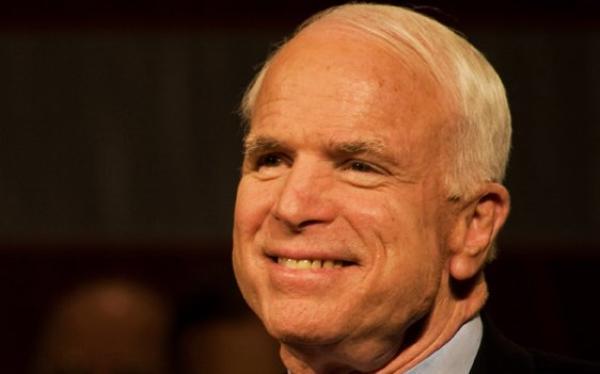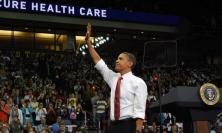What does the future hold for the Republican Party in light of Senator John McCain’s defeat in the US presidential elections? Keith McMillan SJ explores the implications of the forthcoming Obama presidency for the Grand Old Party.
Republicans are destined for the political wilderness after the historic, possibly watershed election of Senator Barack Hussein Obama as President of the United States this Tuesday. Not only has he won the presidency with a clear majority of the votes, he will have overwhelming majorities in both houses in Congress. He is very close to having a filibuster-proof Senate in which 60 votes are needed to shut down debate. The last time the Grand Old Party (GOP) suffered such a dramatic defeat was in the post-Watergate election of 1976 where Jimmy Carter marginally beat the politically wounded Gerald Ford. Being in such a minority in Washington is extremely rare for either party in the recent past.
Historically the GOP was more effective in winning presidential elections than in maintaining ongoing control in either house of Congress. Of the eleven presidential elections since Nixon’s victory in 1968, the GOP have won seven, and in five of these more than 50% of the vote was achieved. Meanwhile, of the four Democratic election victories only in the 1976 and 2008 elections did they reach the 50% mark. Clearly in presidential elections the GOP had a basic advantage.
Does Obama’s election transform the political future of America? Subsequent elections will demonstrate this. However, one can clearly state that the political environment for Republicans in 2008 had very little oxygen. McCain had to swim upstream throughout the campaign. The combination of a very unpopular incumbent Republican president with the dramatic economic stresses over the last few months would have given any GOP presidential candidate a very tough time. In addition, his opponent was effectively energising new voters into the political arena, requiring McCain not only to maintain Bush’s voters but to add a significant number of new voters to the GOP column. In the end he fell short of Bush’s numbers. Some voters just did not turn up. But in many ways Senator McCain can be said to have run a very commendable campaign just by his keeping the election competitive.
Sen. John Sidney McCain was a peculiar GOP candidate, because he has always been a peculiar politician. His personal story, especially his five and a half years as a POW in North Vietnam, is extremely compelling. However, some of the characteristics that allowed him to survive physically and mentally also laid the foundations to place him always at odds with much of the GOP factions. In the past ten to fifteen years he has sought repeated efforts to pick fights with one faction of his party or another. This gained him attention and status nationally, but as a foil by which the mainstream media and the Democrats could attack the GOP. His positions on campaign finance, the early Bush tax cuts, filibustering judges, and immigration, all put him in opposition to the base of the GOP. That relationship was not repaired during the primary season this year. The active base of the GOP only gained some real enthusiasm after Sarah Palin was named as his running mate.
The immediate future for Sen. McCain and the GOP is bleak. Sen. McCain’s current Senate term ends in 2010. At that point he will need to decide whether to remain as a seasoned political force within the Senate. There is a long tradition of people taking that role: Barry Goldwater (whom McCain replaced in the Senate), Strom Thurmond, Jessie Helms, Robert Byrd and Teddy Kennedy. He could be a very effective legislator trying to effect real change independent of the wider political pressures of a younger politician. Or he could decide to ride off and retire to the sun of Arizona. But one assumes he will have only marginal influence in the future of the GOP.
It is difficult to see any nationally elected Republican in Washington having any significant influence on the political world of Washington now. They will be sealed out from all the significant corridors of power. If history is any guide they may not even be allowed to sit on the various Congressional committees at key times. Washington plays hardball, and no national GOP officeholder has even a bat to attempt to respond. These politicians can only react to Democratic initiatives. Their only hope will be that the Democrats will overreach in their goals and provide the oxygen for any GOP fight back in the midterm elections in 2010. A corollary in the complete loss of power in Washington will be the significant loss in campaign support from lobbyists. Lobbyists do not necessarily give money to those to whom they are ideologically aligned, but to those who hold the keys to taxing and spending. Hence the GOP fight back will be even more difficult because their funds to fight the next campaign should be significantly less than the Democrats’.
What of the future of the GOP? Well the richness of the US political system is that even when the power of political parties is at a low ebb in Washington, there are always the states, especially when considering presidential politics. Sen. Obama’s election is only the third successful presidential election of a sitting US senator since 1900, the other two being Warren Harding (1920) and John Kennedy (1960). On Wednesday 5 November 2008 there are twenty-some GOP governors who are all calculating if and how they can place themselves into the 2012 primary season. Various governors such as Crist of Florida and Pawlenty of Minnesota will probably be making some calculations, as will Daniels, just comfortably re-elected in Indiana. Two former governors who ran for the presidency this year, Mitt Romney and Mike Huckabee, will also be keen.
However two young state governors stand out to present a new generation of leaders for the GOP: Sarah Palin of Alaska and Bobby Jindal of Louisiana. Despite, and in some ways because of, the manner in which she was treated by the national press, Palin has quickly gained cult status within sections of the GOP, especially those who would call themselves social conservatives. Because of her natural political charisma she will be highly sought-after for GOP fundraisers, where she can gain allies across the country and build a national campaign team. She will probably be a formidable force in 2012.
Gov. Bobby Jindal, 37, has for a decade or more been seen as a potential national GOP figure. Through various Louisiana state executive offices and as a Congressman he has shown great leadership and astute political skills. A child of Indian immigrants, he converted to Catholicism in his early teens. He presents an image of the party that many find attractive. The fact that he has achieved such prominence within the Old South demonstrates his profound political skills.
Irrespective of the individuals, the GOP must face a decision concerning where they go from here. Does one just say that the fundamentals of a political coalition are fine and the 2008 defeat is merely a result of a very unpopular president? Or is substantial reconfiguration of its coalition of factions needed? An argument can be made that the coalition is still solid, just that the politicians have not fulfilled the promises to those factions. Fiscal conservatism has been a key component of the Republican ideology. However the loss of control in the House and Senate in 2006 and the continued losses in 2008 indicate some disillusionment among the rank and file. The massive spending increases while under a Republican Congress and President gave GOP voters little reason to listen to another appeal from their politicians concerning fiscal responsibility. The financial crisis just amplifies that dissonance. The brand of fiscal conservatism needs to be repaired. Since the Republicans will not have much, if any, power in Washington they can freely make appeals for prudent and meagre funding proposals. However, that will not solidify the brand, because all they say will be justly seen as empty spin. It will be the governors controlling their state budgets who will be in a position to demonstrate fiscal conservatism.
Some within the old establishment country club wing of the Republican Party would wish the culture wars would fade away. They would blame the focus on abortion, gay marriage, and the right to bear arms as preventing an expansion of the GOP base. But the culture wars will not fade away, but may even intensify, especially regarding abortion. The incoming president has shown less support for the rights of the unborn child than any president in US history. He intends to impose federal regulations disregarding individual states’ democratic compromises on how abortion should be regulated. This will heighten the political debate about abortion and state rights. Regulation of stem cell research and manipulation of fertilized human embryos will again become prominent issues. Combining all that with the two or three Supreme Court Justices that Obama will inevitably appoint in the coming four year term, the culture wars will continue. A generational attempt to have the Supreme Court reverse its original abortion decision was about to be achieved with a McCain victory. The reversal would not have outlawed abortion nationally but merely returned the responsibility to the individual states, where the democratic process could work out some sort of compromise that would lance the decades-old political boil.
Here the GOP needs to be concerned. It could lose the energetic participation of what is called the ‘religious right’, which has been a key component of its coalition since Reagan’s 1980 election. Unless the party can convince the religiously motivated electorate that their cultural and family concerns will be listened to and dealt with, there will be a depoliticization of the religious right. The result would be the GOP losing one of the main legs within its coalition. An indication of the need to be really heard and appreciated can be seen in the cultural response to Gov. Palin’s selection as McCain’s running mate. She touched a cultural nerve that revealed the deep-seated fissures with the American culture that cannot be ignored. The mere fact that she undertook to bear and raise a Downs Syndrome baby was seen as a bold political statement. Much of the extreme reaction to her was related to the profound scars left by 35 years of the most extreme abortion laws in the world, in which over 40 million babies have been aborted. The thousands of women and children who came out to her rallies were unprecedented within Republican circles.
The unspoken component of the contemporary issues is national security. A very simple way in which to describe the differences between the two parties is to describe the Republicans as the party of after 9/11 and the Democrats as the party of before 9/11. There is a wing of the GOP which may be called the Jacksonian wing, after President Andrew Jackson – its attitude is: if attacked, attack, but otherwise draw up the bridge and keep to oneself. Another wing would see themselves as needing to promote democracy throughout the world so as to protect US security and to benefit the greatest number of people in the world. Where the party goes in a post-Iraq, post-Afghanistan world will be a big issue. In the end, the Republican stance on national security issues will be their reaction to events and to Obama’s response to these events.
Tied to that will be the overall attitude to international relations, particularly regarding international trade. One of the reasons for the international credit crunch is the evermore globally integrated economy. It has brought unprecedented prosperity throughout the world, and yet in a downturn such as the one we find ourselves in now, it becomes harder to convince the public of that fact. Sen. Obama gives indications of being significantly more protectionist than any US administration in recent times; but it is worth remembering that the downturn in 1929 was not driven by the Wall Street Crash, but the Republican protectionist reaction to it.
The GOP will not influence the international security and economic issues, but they will merely react to events. The same goes for most domestic issues as well, at least for the first two years of the Obama administration. Sen. Obama’s administration will determine in many ways the direction and prospects of the GOP. If he governs from the moderate-left (in an American understanding of left) as President Clinton did for the last six years of his presidency, then the GOP may be playing a reactive role for years to come. If Obama can place himself between an over-energetic Congress and the public, presenting himself as a prudent and discerning protector of the common good, the Republicans will find him a very difficult figure to attack. However, if he perceives his own election as well as the expanded majorities in both houses of Congress as a sign of an energetic, very leftist agenda, and acts accordingly, then the GOP will be able to gain the political initiative much more quickly.
In the end, the influence of the GOP has left Washington and will now be dispersed to various state capitals. The real national influential powers will be in the alternative media: talk radio and the Internet. The ability to share information in a more diffuse manner is coming to have even greater political effect in the upcoming years. Many in the GOP have lost respect for the mainstream media. Even in this heightened election year the main television networks have lost some of their audience. Many formerly powerful newspapers such as the New York Times, the Washington Post and the LA Times are all having severe economic troubles, laying off hundreds of employees and making significant financial losses. The new media are providing choice to the electorate of where they get their news. These new vehicles will be key to the development of a national GOP response to the current political concerns. That may be also why the new Democratic Congress gives indications that they will strive to silence or neuter these new powerful outlets. It would not surprise me if the first large domestic political battle will be trying to rein in these alternative media.
Keith P. McMillan SJ is assistant priest at Sacred Heart Church in Wimbledon.
Read more of Thinking Faith's coverage of the US elections:
![]() A Tale of Two Presidents – Michael Sean Winters
A Tale of Two Presidents – Michael Sean Winters
![]() What scares me about Obama – Gregory Chisholm SJ
What scares me about Obama – Gregory Chisholm SJ
![]() Obama and the politics of community organising – Austen Ivereigh
Obama and the politics of community organising – Austen Ivereigh
![]() Blessed and Broken: How Religion Infuses and Confuses American Presidential Politics – Paul Brian Campbell SJ
Blessed and Broken: How Religion Infuses and Confuses American Presidential Politics – Paul Brian Campbell SJ






